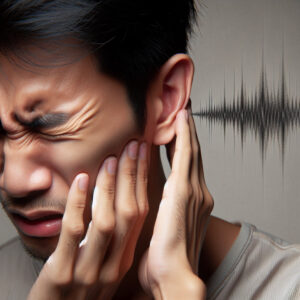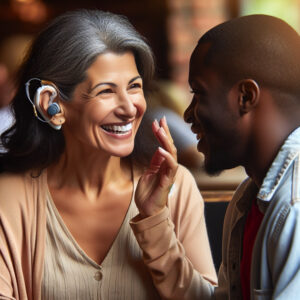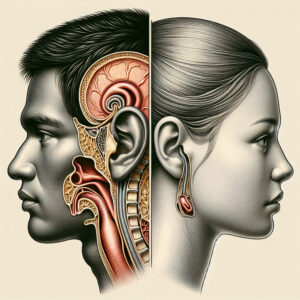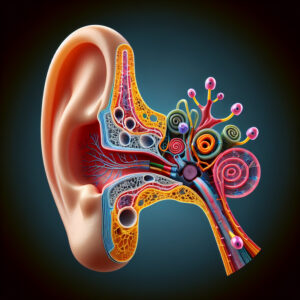Tinnitus with Normal Hearing: Expert Advice and Insights
Understanding Tinnitus with Normal Hearing What is Tinnitus? Tinnitus is a condition characterized by the perception of noise or ringing in the ears, which is not caused by an external sound. It is often described as a ringing, buzzing, hissing, or clicking sound that can vary in pitch and intensity. Tinnitus can be temporary or… Read More
Ear Not Hearing? Here’s What You Need to Know
Introduction: Understanding “Ear Not Hearing” Issues Experiencing problems with your hearing can be both frustrating and concerning. Whether it’s a mild reduction in sound clarity or a complete inability to hear, addressing “ear not hearing” issues is crucial for maintaining your quality of life. Hearing problems can affect your communication, social interactions, and overall well-being…. Read More
Early Hearing Loss: What You Need to Know for Better Hearing Health
Introduction to Early Hearing Loss Understanding Early Hearing Loss Early hearing loss is a condition where a person’s ability to hear diminishes earlier than typically expected. It can affect individuals of all ages, including infants, children, and young adults. This condition can be subtle, making it challenging to detect without proper screening and awareness. Early… Read More
Natural Remedies for Managing Autoimmune Disease Hearing Loss
Introduction to Autoimmune Disease Hearing Loss Autoimmune disease hearing loss is a condition where the body’s immune system mistakenly attacks the inner ear, leading to hearing impairment. Several autoimmune diseases can affect hearing, including lupus, rheumatoid arthritis, and Cogan’s syndrome. Understanding these conditions and their impact on auditory health is crucial for managing and potentially… Read More
Top Technologies for Managing Partial Hearing Impairment
Introduction to Partial Hearing Impairment Definition of Partial Hearing Impairment Partial hearing impairment, often referred to as partial hearing loss, is a condition where an individual experiences a reduction in their ability to hear sounds in one or both ears. This impairment can range from mild to moderate and can significantly affect daily communication and… Read More
Middle Ear Deafness vs. Other Types of Hearing Loss: Key Differences
Introduction to Hearing Loss Hearing loss is a prevalent health concern that affects millions of individuals worldwide. It is defined as a partial or complete inability to hear sounds in one or both ears. The condition can vary in severity, ranging from mild to profound hearing impairment. Understanding the different types of hearing loss is… Read More
Deaf by Birth Treatment: A Comprehensive Guide for Parents
Understanding Deafness by Birth Causes of Congenital Deafness Deafness by birth, also known as congenital deafness, can result from various factors. Genetics play a significant role, with many cases linked to inherited conditions. Infections during pregnancy, such as rubella or cytomegalovirus, can also lead to hearing loss in newborns. Additionally, complications during childbirth, including oxygen… Read More
How Hearing Loss Associated with Aging Impacts Daily Life
Introduction to Hearing Loss Associated with Aging Understanding Age-Related Hearing Loss Age-related hearing loss, also known as presbycusis, is a common condition that affects many older adults. This type of hearing loss typically occurs gradually and affects both ears equally. It is primarily caused by changes in the inner ear, but other factors such as… Read More
Cytomegalovirus Hearing Loss: Advances in Research and Treatment
Introduction to Cytomegalovirus Hearing Loss Hearing loss linked to cytomegalovirus (CMV) is a significant health concern, especially for infants and young children. Understanding CMV and its impact on hearing is crucial for early detection and treatment. This blog post explores the connection between CMV and hearing loss, recent research advancements, and current treatment options. We… Read More
Can Allergies Be a Common Cause of Conductive Hearing Loss? Find Out Here!
Introduction: Understanding Conductive Hearing Loss Conductive hearing loss is a type of hearing impairment where sound waves are unable to travel through the outer ear, eardrum, or middle ear. Unlike sensorineural hearing loss, which is due to inner ear or nerve damage, conductive hearing loss stems from physical obstructions or dysfunctions in the ear’s conduction… Read More
Living with Otitis Tinnitus: Coping Strategies and Support
Introduction to Otitis Tinnitus What is Otitis Tinnitus? Otitis Tinnitus is a condition that combines the effects of both otitis, which is an inflammation or infection of the ear, and tinnitus, a persistent ringing or buzzing noise in the ears. This dual condition can be particularly challenging as it not only involves infection but also… Read More
Exploring Neural Presbycusis: What You Need to Know
Understanding Neural Presbycusis: An Overview Neural presbycusis is a specific type of age-related hearing loss that primarily affects the auditory nerve. This condition is distinct from other forms of presbycusis, which might involve the inner ear structures or the cochlea. As we age, various changes occur in our auditory system, and understanding these changes is… Read More
Coping with Hearing Loss: Emotional and Psychological Support
Introduction to Coping with Hearing Loss Hearing loss can be a challenging condition that affects not only your ability to hear but also your emotional and psychological well-being. Coping with hearing loss involves understanding the emotional impact it has on your life and taking proactive steps to seek support. In this article, we will explore… Read More
How Acoustic Neural Stimulation Can Improve Your Hearing Health
Introduction to Acoustic Neural Stimulation Defining Acoustic Neural Stimulation Acoustic neural stimulation is an innovative approach to improving hearing health. It employs sound waves and electrical impulses to stimulate the auditory nerve, enhancing neural pathways related to hearing. This technique is particularly beneficial for individuals with hearing impairments, offering an alternative to traditional hearing aids…. Read More
Single Sided Hearing Loss in Children: Early Signs and Intervention
Introduction to Single Sided Hearing Loss in Children Definition and Overview Single sided hearing loss (SSHL) in children refers to the condition where a child experiences hearing impairment in one ear while the other ear retains normal hearing ability. This type of hearing loss can range from mild to profound and can significantly impact a… Read More
















